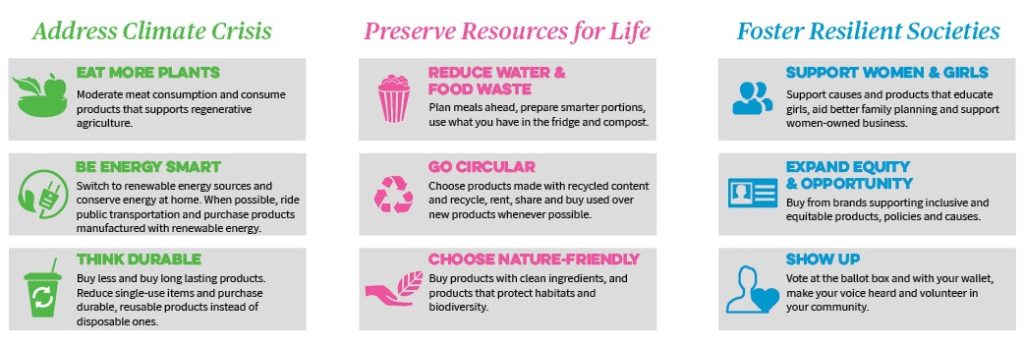Brands and retailers harness their collective power to activate win-win partnerships that drive positive business results and meaningful consumer behavior change.
From the early days of retail, where shoppers knew their butchers, tailors, and shopkeepers by name, to today’s landscape of mega markets, online shopping, and boxes of goodies being left on our doorstep, we’ve seen a tremendous shift in how people connect with brands and retailers. Brands for Good research shows that an overwhelming 96% of U.S. consumers would like brands to help them lead a more sustainable lifestyle.1 Which then comes as no surprise that sustainably-marketed products have grown seven times faster than conventionally marketed products over the past four years.2
Even though statistically, shoppers are aspiring to live, purchase and behave more sustainably, their good intentions do not always translate into actions. The barriers leading to this intention-action gap are varied, but poor perceived value, not knowing where to start, and feeling that they themselves cannot make an impact are the top three. Shoppers are often in auto-pilot mode when making purchase decisions at retail, defaulting to what is convenient and familiar. This is a huge opportunity for brands and retailers to combine forces and step in as leaders through inspiration and education.
Through proprietary research, Brands for Good has identified the Nine Most Impactful Sustainable Behaviors that brands and consumers can take together to drive a culture of sustainable living, as well as to deepen consumer engagement with brands. By focusing on these nine behaviors, brands and retailers can confer a competitive advantage while also helping shoppers make purchase decisions that benefit our planet, our society and help protect and preserve our natural resources.

Addressing the intention-action gap in a retail environment, when people are in shopping mode, is a great place to start. It is the moment of truth when shoppers are deciding what to click on, or pick up, and add to their carts. If more brands and retailers can translate their ESG commitments into partnerships that drive commercial innovation and better shopping experiences, they will not only deliver better margins and customer loyalty, but will also play their part in closing the intention-action gap while driving sustainable consumer behavior change.
For example, Clorox’s Brita brand (a durable, filtered water pitcher and alternative to bottled water) partnered with regional retailer Meijer, and recycling company TerraCycle, to drive sales by engaging shoppers and their communities to participate in their filter recycling program and enter for a chance to win a “Recycled Garden” for their local school. This program was brought to life online and in-store through incremental pallet displays and end caps with QR codes that engaged shoppers and community schools. Not only did they drive multiple sustainable behaviors among consumers, including ‘Think Durable’, ‘Go Circular’, and ‘Show Up’, they also drove incremental sales and retail dollar share that exceeded both brand and retailer expectations.
An example of driving the sustainable behavior ‘Be Energy Smart’ is illustrated by Procter & Gamble’s Tide brand when they launched their #TurnToCold campaign that encourages consumers to use cold water when washing their clothes – a switch that reduces energy use up to 90%. In addition to a robust media campaign, the brand reached shoppers through retail activation partnerships with Hanes and Walmart. Hanes featured a “wash in cold” call-to-action, on their garments, along with Tide PODS samples and coupons, on packaging and branded shipper displays to help communicate that consumers can get a superior clean in cold water with Tide – even when washing underwear, T-shirts and socks.
These examples only scratch the surface on the potential that brands and retailers can achieve when partnering together to help advance the adoption of the Nine Most Impactful Sustainable Behaviors. SB Brands for Good has partnered with Grounded World and a selection of Brands for Good Corporate Partners including (but not limited to) Target, CVS Health, The Clorox Company, Procter & Gamble, and General Mills to create the second edition in the series of Excellence in Execution: Retail Activation for Good. This playbook focuses on how omni-channel and shopper marketing campaigns can be used to encourage consumers to adopt these sustainable behaviors.
In addition to a library of inspirational examples and case studies, this playbook includes a set of ten key principles that brands and retailers can follow to better plan, create, execute and measure the impact of these types of initiatives. More often than not consumers are voting with their dollars in support of sustainable products, and this playbook provides an opportunity for shopper marketing teams to drive activations that close the intention-action gap in retail.
Excellence in Execution Series
The Brands For Good Excellence in Execution series is a collection of playbooks for creating breakthrough creative work across a range of marketing areas, including a list of best practices and a library of inspirational examples that drive action on the Nine Most Impactful Behaviors. These guides have been co-created by our Corporate Partners who share their best-in-class case studies and thoughtful insight on what they have found to be optimal creative solutions for their marketing strategies.
Visit sbbrandsforgood.com/excellence-in-execution to learn more about this playbook series, or contact Brands for Good at [email protected] to learn more about joining the world’s leading brands unleashing the power of their brand influence to drive consumer behavior change at scale.
Kristen Tetrick
Brands for Good, Sustainable Brands
